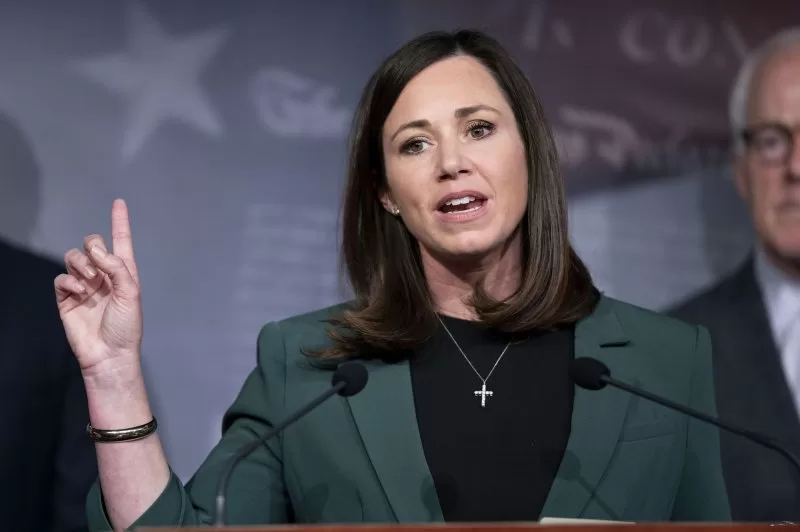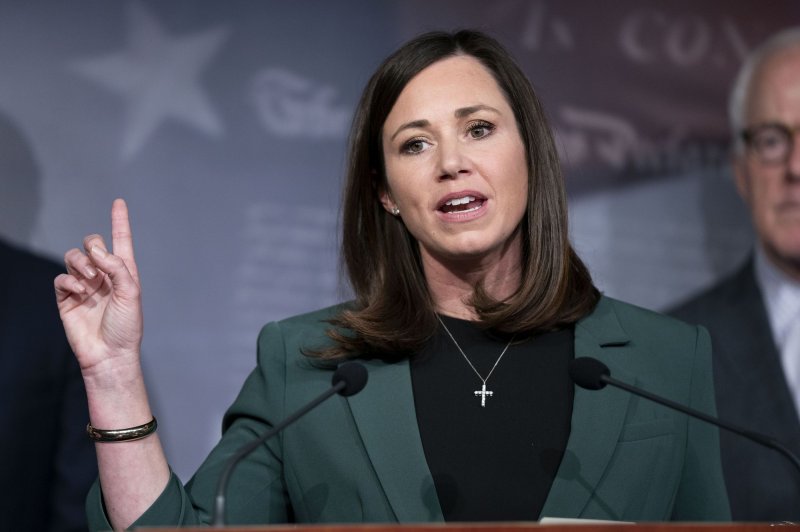1 of 3 | Sen. Katie Britt, R-Ala, speaks during a December 2023 press conference at the U.S. Capitol in Washington, D.C. “This common-sense piece of legislation affirms both life and liberty — family and freedom,” Britt said in a joint news release with Cruz. File Photo by Bonnie Cash/UPI |
License PhotoMay 20 (UPI) — Two conservative Republican senators on Monday introduced a bill that seeks to protect access to in vitro fertilization, known as IVF, after a past effort by Senate Democrats failed in February.
The three-page bill introduced Monday, styled as the “IVF Protection Act,” was sponsored by Sen. Katie Britt, R-Ala., and Sen. Ted Cruz, R-Texas.
“This common-sense piece of legislation affirms both life and liberty — family and freedom,” Britt said in a joint news release with Cruz, who commented he was “proud” to partner with Britt while saying IVF “has given miraculous hope to millions of Americans, and it has given families across the country the gift of children.”
With the bill’s language, states would be ineligible to receive Medicaid funding if an outright IVF ban has been enacted and as written says states “shall not prohibit in vitro fertilization (as defined in section 4(b) of the IVF Protection Act) services,” and ”shall ensure that no unit of local government in the State prohibits such services.”
This bill comes as Republicans have been scrambling to coalesce around a consistent message regarding abortion, and after a February ruling by Alabama’s Supreme Court that said frozen fertilized embryos are children under state law.
The Alabama IVF ruling attracted deep nationwide criticism and worry over the potential consequences from civil rights and medical organizations. It prompted the Republican-controlled legislature to quickly act on an IVF protection bill which was swiftly signed into law by Gov. Kay Ivey, a pro-life Republican.
The Britt-Cruz legislation builds upon efforts taken in February by Sen. Tammy Duckworth, D-Ill., who first introduced a bill to protect IVF treatments nationwide after the Alabama ruling, which quickly got blocked by Sen. Cindy Hyde-Smith, R-Miss.
But on a Monday television appearance, Cruz said Duckworth’s bill did not pass muster because, he claimed, “it really seeks to backdoor in broader abortion legislation,” adding how his and Britt’s bill is simply “designed to protect IVF” as he pointed out how in the bill it says that 2% of live births in the United States are via IVF.
Duckworth’s IVF bill, Cruz said, was “very broad. There’s a reason that no Republican supported it,” as he claimed it was written to give the federal government authority over abortion.
As for the Alabama ruling, Cruz said there was “a lot of confusion, there was a lot of fear, there was a lot of misunderstanding” surrounding the February decision and the eventual political fallout. Cruz went on to state how the variety of opinions of abortion in general is proof that it should be a state issue, which is consistent with what former President Donald Trump has been saying about abortion being a state issue in one of his multiple takes on the issue over the years.
“[The IVF bill] should be overwhelmingly bipartisan,” the Texas Republican said about the possibility his senate colleagues on both sides will voting in favor of his bill with Britt.
On social media Monday afternoon, Cruz claimed that after the Alabama IVF ruling, “Democrats and the media callously manipulated the ruling to attack Republicans over IVF.”
“There are 100 senators,” Cruz said on NewsMax, “to the best of my knowledge all 100 senators support IVF. So this should be a bipartisan bill.”
Sawyer Hackett, a Democratic strategist, said the bill as proposed by Cruz and Britt has two catches: “It does *nothing* to protect IVF from courts enforcing ‘personhood’ laws (see Alabama ruling),” he posted on X, and “it explicitly allows states to push ‘health and safety standards’ for IVF.”
“Let’s be clear,” Cruz’s 2024 Democratic senate opponent, U.S. Rep. Colin Allred, D-Texas, said Monday on X.
“Ted Cruz’s long-standing support for an extreme ban on abortion is what is putting IVF at risk for Texas families.”

